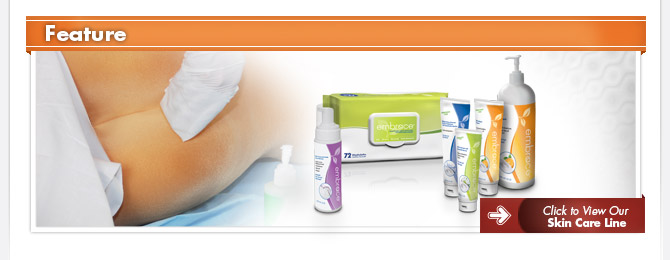|
Best Practices: Perineal Skin Care
It's crucial that your staff provide great care to your residents' delicate perineal skin to avoid potentially serious skin conditions. We recommend reviewing the following steps with your staff as a refresher course on providing quality care.
Materials needed: Disposable washcloths/wipes, towels, linens, underpads, perineal cleanser, barrier cream and gloves
Step 1: Wear gloves and use wipes to remove heavy soiling prior to perineal care. Then remove or discard gloves and wash your hands. Place a protective underpad under the resident's buttocks. Cover the resident with linens and raise them to only expose the perineum. Wash your hands and put on clean gloves for perineal care.
Step 2: Using a washcloth or wipe, apply perineal cleanser sparingly. Gently wipe the perineal area, wiping from "clean" urethral to "dirty" rectal area to avoid contamination.
Step 3: If an indwelling catheter is present, hold and support the catheter tubing to one side to avoid traction or unnecessary movement during the procedure. When cleaning the urethral area, gently spray and wipe the catheter tubing from the urethra outward for about three inches of tubing. Keep the drainage bag below the level of the bladder.
Step 4: Turn the resident on his side. Spray a wipe with perineal cleanser and gently wipe the remaining area, including the rectum and buttocks, without returning to the urethral area. Appropriately and gently cleanse from clean to dirty areas, leaving the entire area clean and dry.
Step 5: Apply a moisture barrier to the buttocks and peri area.
Step 6: Remove the soiled linens and place them in an appropriate receptacle. Leave the resident in a position of comfort.
Registered promedsupply.com customers can access and download our exclusive in-service guides at any time by clicking on Education and selecting Product In-Service Guides on the website. Not a registered user? Just give us a call at (800) 648-5190 and one of our Customer Care Professionals will be happy to get you set up.
| |









